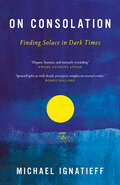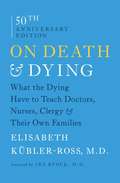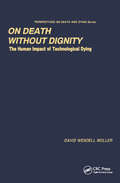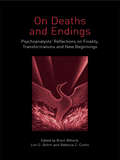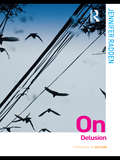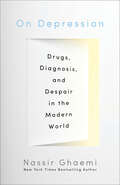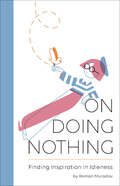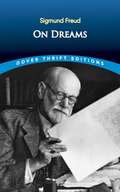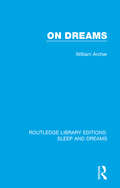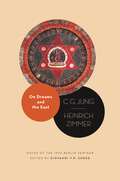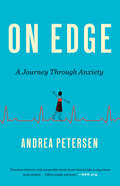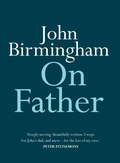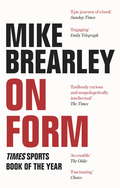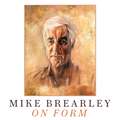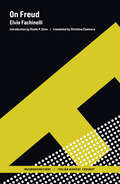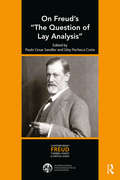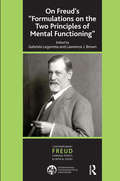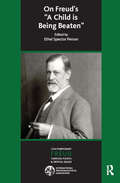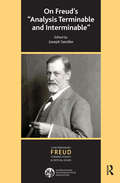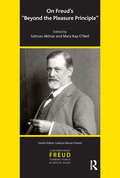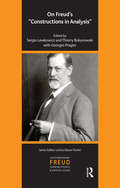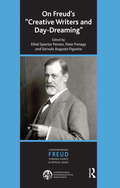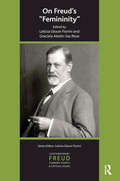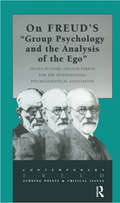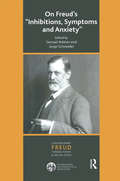- Table View
- List View
On Consolation: Finding Solace in Dark Times
by Michael IgnatieffTimely and profound philosophical meditations on how great figures in history, literature, music, and art searched for solace while facing tragedies and crises, from the internationally renowned historian of ideas and Booker Prize-finalist Michael Ignatieff.When someone we love dies, when we suffer loss or defeat, when catastrophe strikes--war, famine, pandemic--we go in search of consolation. Once the province of priests and philosophers, the language of consolation has largely vanished from our modern vocabulary, and the places where it was offered, houses of religion, are often empty. Rejecting the solace of ancient religious texts, humanity since the sixteenth century has increasingly placed its faith in science, ideology, and the therapeutic.How do we console each other and ourselves in an age of unbelief? In a series of lapidary meditations on writers, artists, musicians, and their works--from the books of Job and Psalms to Albert Camus, Anna Akhmatova, Elisabeth Kubler-Ross and Primo Levi--esteemed writer and historian Michael Ignatieff shows how men and women in extremity have looked to each other across time to recover hope and resilience. Recreating the moments when great figures found the courage to confront their fate and the determination to continue unafraid, On Consolation takes those stories into the present, movingly contending that we can revive these traditions of consolation to meet the anguish and uncertainties of our precarious twenty-first century.
On Death without Dignity: The Human Impact of Technological Dying (Perspectives on Death and Dying)
by David Wendell MollerCandidly written, ""On Death Without Dignity: The Human Impact of Technological Dying"", attempts to re-humanize the inevitable biological occurrence called dying. It is Moller's view that through the advancement of medicalized technology, has come the demise of the contemporary dying process. The oncological death is reflected as failure in the part of modern medicine, the physician, and the hospital; yet the patient experiences alienation, stigma, helplessness, and normlessness. Yet as a culture the current societal approach to the dying-silent avoidance-only adds to this alienation. Society has failed to provide the necessary rules for this universal, social, and biological event.
On Deaths and Endings: Psychoanalysts' Reflections on Finality, Transformations and New Beginnings
by Brent Willock Lori C. Bohm Rebecca C. CurtisWinner of the 2008 Gradiva Award! Can something as negative as loss also be a positive, transformative experience? Is it possible that not only individuals but also societies can be developmentally arrested by problematic mourning? On Deaths and Endings brings together the work of psychoanalytic scholars and practitioners grappling with the manifold issues evoked by loss and finality. The book covers the impact of endings throughout the life cycle, including effects on children, adolescents, adults, those near death and entire societies. New psychoanalytic perspectives on bereavement are offered based on clinical work, scholarly research and the authors’ own, deeply personal experiences. The contributors present compelling, often moving, enquiries into subjects such as the reconfiguration of self-states subsequent to mourning, the role of ritual and memorials, the tragic impact of unmourned loss, modern conceptualisations of the death instinct, and terror-based losses. In that much psychotherapy is conducted with people who have suffered some form of loss, this book will be an invaluable resource for all mental health professionals. The emphasis on the potential of working through the vicissitudes of these experiences will provide inspiration and hope both to those who have endured personal loss and to anyone working with grieving patients.
On Delusion (Thinking in Action)
by Jennifer RaddenDelusions play a fundamental role in the history of psychology, philosophy and culture, dividing not only the mad from the sane but reason from unreason. Yet the very nature and extent of delusions are poorly understood. What are delusions? How do they differ from everyday errors or mistaken beliefs? Are they scientific categories? In this superb, panoramic investigation of delusion Jennifer Radden explores these questions and more, unravelling a fascinating story that ranges from Descartes’s demon to famous first-hand accounts of delusion, such as Daniel Schreber’s Memoirs of My Nervous Illness. Radden places delusion in both a clinical and cultural context and explores a fascinating range of themes: delusions as both individually and collectively held, including the phenomenon of folies á deux; spiritual and religious delusions, in particular what distinguishes normal religious belief from delusions with religious themes; how we assess those suffering from delusion from a moral standpoint; and how we are to interpret violent actions when they are the result of delusional thinking. As well as more common delusions, such as those of grandeur, she also discusses some of the most interesting and perplexing forms of clinical delusion, such as Cotard and Capgras.
On Depression: Drugs, Diagnosis, and Despair in the Modern World
by S. Nassir GhaemiLasting happiness comes not from chasing the American dream but from living an authentic life—which includes despair.In a culture obsessed with youth, financial success, and achieving happiness, is it possible to live an authentic, meaningful life? Nassir Ghaemi, director of the Mood Disorder Program at Tufts Medical Center, reflects on our society's current quest for happiness and rejection of any emotion resembling sadness. On Depression asks readers to consider the benefits of despair and the foibles of an unexamined life. Too often depression as disease is mistreated or not treated at all. Ghaemi warns against the "pretenders" who confuse our understanding of depression—both those who deny disease and those who use psychiatric diagnosis "pragmatically" or unscientifically. But experiencing sadness, even depression, can also have benefits. Ghaemi asserts that we can create a "narrative of ourselves such that we know and accept who we are," leading to a deeper, lasting level of contentment and a more satisfying personal and public life. Depression is complex, and we need guides to help us understand it, guides who comprehend it existentially as part of normal human experience and clinically as sometimes needing the right kind of treatment, including medications. Ghaemi discusses these guides in detail, thinkers like Viktor Frankl, Rollo May, Karl Jaspers, and Leston Havens, among others. On Depression combines examples from philosophy and the history of medicine with psychiatric principles informed by the author's clinical experience with people who struggle with mental illness. He has seen great achievements arise from great suffering and feels that understanding depression can provide important insights into happiness.
On Doing Nothing: Finding Inspiration in Idleness
by Roman MuradovIn an age of obsessive productivity and stress, this illustrated ode to idleness invites you to explore the pleasures and possibilities of slowing down.Beloved author and illustrator Roman Muradov weaves together the words and stories of artists, writers, philosophers, and eccentrics who have pursued inspiration by doing less. He reveals that doing nothing is both easily achievable and essential to leading an enjoyable and creative life. Cultivating idleness can be as simple as taking a long walk without a destination or embracing chance in the creative process. Peppered with playful illustrations, this handsome volume is a refreshing and thought-provoking read.“Whimsical, clever, and companionable . . . On Doing Nothing provides a much-needed correction to our distracted, anxiety-ridden, and increasingly disembodied culture. Muradov has written and illustrated a kind of Situationist, Oulipian Ways of Seeing—a manual for clarity and presence, a book which issues a call to attention; a call to pay attention. The smart yet approachable philosophical reflections unfold like a leisurely stroll through a beautiful and unfamiliar city, provoking thoughtfulness and eliciting in the reader a spirit of discovery.” —Peter Mendelsund, author of What We See When We Read
On Dreams (Dover Thrift Editions Ser.)
by Sigmund Freud M. D. EderAmong the first of Sigmund Freud's many contributions to psychology and psychoanalysis was The Interpretation of Dreams, published in 1900, and considered his greatest work -- even by Freud himself. Aware, however, that it was a long and difficult book, he resolved to compile a more concise and accessible version of his ideas on the interpretation of dreams. That shorter work is reprinted here. Since its publication, generations of readers and students have turned to this volume for an authoritative and coherent account of Freud's theory of dreams as distorted wish fulfillment.After contrasting the scientific and popular views of dreams, Freud illustrates the ways in which dreams can be shown to have been influenced by the activities or thoughts of the preceding day. He considers the effect on dreams of such mental mechanisms as condensation, dramatization, displacement, and regard for intelligibility. In addition, the author offers perceptive insights into repression, the three classes of dreams, and censorship within the dream.Students and psychologists will welcome this inexpensive edition of an always-relevant work by the father of modern psychoanalysis. This volume will also appeal to anyone interested in dreams of the workings of the unconscious mind.
On Dreams (Routledge Library Editions: Sleep and Dreams #1)
by William ArcherOriginally published in 1935, William Archer’s interest in dreams had persisted for over quarter of a century, for ten years of which he kept a careful record of his own dreams. These records alone form a valuable collection of material, of which Archer made good use in the writing of the book on dreams on which he was engaged at the time of his death; large parts of these dream-records are reproduced in this book. He left this book partly finished, partly in draft, and partly in the form of notes. In putting together this material the editor, Theodore Besterman, tries to carry out Archer’s intentions as closely as possible, and believed that he represented the book as he would have wished it to appear. It was unquestionably an important contribution to a difficult subject at the time, the result of many years’ study and reflection.
On Dreams and the East: Notes of the 1933 Berlin Seminar (Philemon Foundation Series)
by C. G. Jung Heinrich ZimmerJung&’s landmark seminar on the symbolism of yoga and its applications to dream analysisIn the summer of 1933, C. G. Jung conducted a seminar in Berlin attended by a large audience of some 150 people, including several Jewish Jungians who would soon leave Germany. Hitler had begun consolidating his position as dictator and these students were distressed at Jung&’s recent decision to accept the presidency of a German professional psychotherapy society that was rapidly becoming Nazified and purged of Jews. On Dreams and the East makes these seminar sessions widely available for the first time, offering tantalizing insights into Jung&’s evolving understanding of yoga and the realization of the self.The seminar commences with a presentation on the psychology of yoga by noted Indologist and linguist Heinrich Zimmer, whose collaboration in these talks reflects Jung&’s growing engagement with the Hindu tradition, particularly Tantric yoga. Jung analyzes a series of dreams of a middle-aged male patient, focusing on mandalas and the centering process. He reflects on related motifs in alchemical symbolism, Navaho healing drawings, Mithraism, baptism symbolism, the foundation of Rome, ecclesiastic dances, and labyrinths, drawing connections with the symbolism of yoga and Tantra.Featuring a richly documented introduction by Giovanni Sorge, On Dreams and the East opens a window on Jung&’s deepening exploration of Eastern thought and the comparative study of the individuation process at a critical juncture in his life and work.
On Edge: A Journey Through Anxiety
by Andrea PetersenA celebrated science and health reporter offers a wry, bracingly honest account of living with anxiety. A racing heart. Difficulty breathing. Overwhelming dread. Andrea Petersen was first diagnosed with an anxiety disorder at the age of twenty, but she later realized that she had been experiencing panic attacks since childhood. With time her symptoms multiplied. She agonized over every odd physical sensation. She developed fears of driving on highways, going to movie theaters, even licking envelopes. Although having a name for her condition was an enormous relief, it was only the beginning of a journey to understand and master it—one that took her from psychiatrists’ offices to yoga retreats to the Appalachian Trail. Woven into Petersen’s personal story is a fascinating look at the biology of anxiety and the groundbreaking research that might point the way to new treatments. She compares psychoactive drugs to non-drug treatments, including biofeedback and exposure therapy. And she explores the role that genetics and the environment play in mental illness, visiting top neuroscientists and tracing her family history—from her grandmother, who, plagued by paranoia, once tried to burn down her own house, to her young daughter, in whom Petersen sees shades of herself. Brave and empowering, this is essential reading for anyone who knows what it means to live on edge.
On Father
by John BirminghamJohn Birmingham's father died. And his life fell apart. The next six months were spent grinding through the black forests of depression until he finally emerged out of the darkness onto sunlit upland. A unique yet universal story, On Father reaches out to everyone who has experienced and survived deep grief.'Deeply moving. Beautifully written. I wept. For John's dad, and anew - for the loss of my own.' PETER FITZSIMONS
On Form: The Times Book of the Year
by Mike BrearleyTHE TIMES BOOK OF THE YEARDAILY TELEGRAPH SPORTS BOOKS OF THE YEARLONGLISTED FOR THE WILLIAM HILL SPORTS BOOK OF THE YEAR 2017What is being on form? How does it relate to feeling 'in the zone'? Are these states in the lap of the gods, a matter of which side of the bed we got out of that morning? Or is there anything we can do to make their arrival more likely?In this fascinating book, former England cricket captain and psychoanalyst Mike Brearley draws on his own experiences, both on and off the field, and examines many of the elements of being in and out of form across a number of different disciplines - not only in cricket and psychoanalysis but also in finance, music, philosophy, medicine, teaching, tree surgery and drama.Perceptive and engaging, On Form is an exploration of the benefits and risks of being on form and can help us all reflect on the range of conditions that block or liberate us.
On Form: The Times Book of the Year
by Mike BrearleyTHE TIMES BOOK OF THE YEARLONGLISTED FOR THE WILLIAM HILL SPORTS BOOK OF THE YEARWhat is being on form? How does it relate to feeling 'in the zone'?Are these states in the lap of the gods, a matter of which side of the bed we got out of that morning? Or is there anything we can do to make their arrival more likely?In this fascinating book, former England cricket captain and psychoanalyst Mike Brearley examines many of the elements of being in and out of form across a number of different disciplines - not only in cricket and psychoanalysis but also in finance, music, philosophy, medicine, teaching, tree surgery and drama. Drawing on his own experiences, both on and off the field, Brearley describes various states of mind, from the conscious determination involved in training and practice through to that almost spiritual state of being 'inspired'. To achieve any level of form requires us to be able to hold different tensions in mind, and to tolerate both ambivalence and ambiguity. Neither form nor creativity can be guaranteed - Brearley illustrates in depth the frequent ways we lose form - though understanding, in a full sense, enables us to make drastic loss of form less likely.Perceptive and engaging, On Form is an exploration of the benefits and risks of being on form and can help us all reflect on the range of conditions that block or liberate us.PRAISE FOR THE ART OF CAPTAINCY:'A work of real substance, valued for its practicality and its precision as well as its balanced humanity and insight' Hilary Mantel'The best book on captaincy, written by an expert' Mike Atherton'A subtle, wise book' Ed Smith'The man-management skills demonstrated by Brearley's handling of Ian Botham remain an inspiration' Nasser Hussain'The Art of Captaincy was, and is, an outstanding book. I would add only three words which I always bear in mind. Keep it simple' Richie Benaud
On Freud (Insubordinations: Italian Radical Thought)
by Elvio FachinelliWritings on Freud by Italy&’s leading psychoanalyst of the twentieth century.Elvio Fachinelli was one of the most original and controversial Italian psychoanalysts of the twentieth century. He viewed psychoanalytic theory as inextricably linked to the concrete experience of everyday reality and as a crucial compass for understanding the social and political turmoil of his era. This compact volume collects Fachinelli&’s writing on Freud, offering readers both an accessible and engaging introduction to Freud&’s thinking and an overview of Fachinelli&’s own main ideas. Written between 1966 and 1989, these essays serve to introduce readers to some of the most provocative aspects of Fachinelli&’s critiques of psychoanalysis and society. On Freud includes a long essay on Freud that weaves the theoretical foundations of psychoanalysis together with a surprising number of idiosyncratic observations about Freud the person. In it, Fachinelli offers a series of parallax perspectives: Freud the conquistador, who leads psychoanalysis to the exploration of new fields of knowledge; Freud the archaeologist, who discovers antithetical and incongruous elements in the territory of the unconscious; and Freud the Victorian, whose bourgeois values clashed with the revolutionary character of his discovery. Other essays include an assessment of psychoanalysis as a general social phenomenon that is increasingly showing its historical limits; a discussion of an encounter between Freud and the poet Rainer Maria Rilke; Fachinelli&’s pointed account of Freud&’s view of psychoanalysis for &“the poor&”; and an examination of the importance of the element of surprise—for both analyst and analysand—in analysis. Without surprise, Fachinelli writes, psychanalysis is just a &“ministering and administering of knowledge, a repetition of the already known.&” This edition includes an authoritative survey of Fachinelli&’s work and insight into how it continues to be relevant today.
On Freud's "The Question of Lay Analysis": Contemporary Freudian Turning Points and Critical Issues
by Paulo Sandler Gley CostaThe questions of what psychoanalysis is, and does, and who can and should practice it, remains key within the modern profession. Has the invaluable material packed into Freud’s The Question of Lay Analysis (1926) been underestimated by contemporary psychoanalysis? This book explores how the issues raised in this paper can continue to impact contemporary Freudian theory and practice. The chapters examine why the arguably litigious nature of the paper might be contributing to its neglect and underestimation. <P><P>The editors of this book put forth a hypothesis: is there an underlying, still unrecognized, but heartrending factor underlying the century-old quarrel between "lay analysts" and what might be described as medically or psychiatrically trained analysts? They then brought together a selection of major contemporary psychoanalytic thinkers from around the world to attempt to bridge the seemingly unbridgeable gap between medical and non-medical analysis, using The Question of Lay Analysis as a central pivot. The work of the key figure, in social and historic terms, on this issue, Theodor Reik, is also duly honoured. <P><P>On Freud’s "The Question of Lay Analysis" will be of great interest to all psychoanalysts and psychoanalytic psychotherapists.
On Freud's ''Formulations on the Two Principles of Mental Functioning'' (The International Psychoanalytical Association Contemporary Freud Turning Points and Critical Issues Series)
by Lawrence J. BrownThis book is a collection of papers by leading contemporary psychoanalysts who comment on the continuing important relevance of Freud's (1911) paper, Formulations on the Two Principles of Mental Functioning. The contributors gathered here represent current European, Latin American, and North American perspectives that elaborate the continuing value of Two Principles for present-day psychoanalytic thinking. Each author examines Freud's paper through a personal lens that is coloured by the psychoanalytic culture from which he or she comes. In each instance, the writers' chapters demonstrate the heuristic value of Two Principles for twenty-first century psychoanalytic theory and technique. A common thread that runs through all the chapters is the view that this brief paper by Freud, which he humbly introduced by stating, "The deficiencies of this short paper, which is preparatory rather than expository ...", is a masterpiece that contains within it the seeds of much of his later writing. The distinction he draws between the pleasure principle and the reality principle are profound and raise questions that still preoccupy analysis today.
On Freud's A Child is Being Beaten (The\international Psychoanalytical Association Contemporary Freud: Turning Points And Critical Issues Ser.)
by Ethel Spector PersonPresents a classic essay by Sigmund Freud, followed by discussions that set Freud's work in context and demonstrate its contemporary relevance. The contributors to this volume represent diverse perspectives from different regions of the psychoanalytic world.
On Freud's Analysis Terminable and Interminable (Ipa - The Contemporary Freud: Turning Points And Critical Issues Ser.)
by Joseph SandlerA discussion by several analysts on the length of treatment, based upon Freud's paper, which is also included. Contributors include Andre Green, Arnold Cooper and David Rosenfeld.
On Freud's Beyond the Pleasure Principle (Ipa Contemporary Freud)
by Salman Akhtar Mary Kay O’NeilFreud's Beyond the Pleasure Principle constitutes a major landmark and a real turning point in the evolution of psychoanalytic theory. Pushing aside the primacy of the tension-discharge-gratification model of mental dynamics, this work introduced the notion of a "daemonic force" within all human beings that slowly but insistently seeks psychic inactivity, inertia, and death. Politely dismissed by some as a pseudo-biological speculation and rapturously espoused by others as a bold conceptual advance, "death instinct" became a stepping stone to the latter conceptualizations of mind's attacks on itself, negative narcissism, addiction to near-death, and the utter destruction of meaning in some clinical situations. The concept also served as a bridge between the quintessentially Western psychoanalysis and the Eastern perspectives on life and death. These diverse and rich connotations of the proposal are elucidated in On Freud's "Beyond the Pleasure Principle". Other consequences of Freud's 1920 paper - namely, the marginalization of ego instincts and the "upgrading" of aggression in the scheme of things - are also addressed.
On Freud's Constructions in Analysis (The\international Psychoanalytical Association Contemporary Freud: Turning Points And Critical Issues Ser.)
by Thierry Bokanowski Sergio Lewkowicz Georges PragierIn Constructions in Analysis Freud introduces the notion of constructions, different from interpretation, and considers it necessary - under certain conditions - to reconstruct a part of the infantile history of the subject. The difference between construction and reconstruction as well as which should be the limit of the intervention of the analyst in order to avoid a proposal far removed from the patient discourse, are a part of present debates on this subject. The editors, together with the contributors to this volume, accepted the challenge to consider Freudian ideas and its implications nowadays.
On Freud's Creative Writers and Day-dreaming: The Contemporary Freud: Turning Points And Critical Issues Series: On Freud's Creative Writers And Day-dreaming (The\international Psychoanalytical Association Contemporary Freud: Turning Points And Critical Issues Ser. #Vol. 4)
by Peter Fonagy Ethel Spector Person Sérvulo Augusto FigueiraThis volume contains Freud's essay 'Creative Writers and Daydreaming' which explores the origins of daydreaming, and its relation to the play of children and the creative process. Each contributor offers an insightful commentary on the essay.
On Freud's Femininity (The\international Psychoanalytical Association Contemporary Freud: Turning Points And Critical Issues Ser.)
by Leticia Glocer Fiorini Graciela Abelin-Sas RoseIn this book a group of contemporary psychoanalytic authors dedicated to studies on women and the feminine have been assembled with the objective of displaying points of concordance and discordance in relation to Freudian proposals. Discourse on women has changed greatly since Freud's time. It coincides with deep changes experienced by women and the feminine position, at least in most of the Western world. It is common knowledge that contraceptives, assisted fertilization, advances in women's rights, growingly evident sublimational capacities and demonstrations of professional success have definitely changed ideas regarding an eternal and immutable feminine nature. The authors are interested in illuminating ways in which these changes have or have not influenced psychoanalytic debate in relation to the feminine. This implies renewing the question of what is authentically feminine and whether there is any essential truth concerning the feminine.
On Freud's Group Psychology and the Analysis of the Ego (Ipa Contemporary Freud #Vol. 6)
by Ethel Spector PersonThe sixth volume in the series "Contemporary Freud: Turning Points and Critical Issues," published with the International Psychoanalytic Association, turns to Group Psychology and the Analysis of the Ego (1921). In this classic text Freud offered an analysis of the roots of group identity, of the contagions of panic and fanaticism, and of the submission of the individual to the leader that only gained cogency with each passing decade of the troubled twentieth century. And Freud's insights have become more relevant still in the aftermath of the shattering events of September 11, 2001. Following an introduction to the volume by Ethel Spector Person and a summary and abridgement of Freud's text by John Kerr, the contributors to this volume - Didier Anzieu, Robert Caper, Abraham Zeleznik, Andre Haynal, Ernst Falzeder, Yolanda Gampel, and Claudio Laks Eisirik - provide commentaries on Freud's work, explicating the multiple ways in which Freud's insights continue to illuminate the irrational dynamics to which all groups, including psychoanalytic institutions, are prey. Serving as both an introduction to, and an elegant expansion of, Freud's texts, this volume demonstrates the role of psychoanalytic hypotheses in obtaining deeper insight into the tectonic shifts in group psychology underlying today's mass society.
On Freud's Inhibitions, Symptoms and Anxiety (The\international Psychoanalytical Association Contemporary Freud: Turning Points And Critical Issues Ser.)
by Gennaro Saragnano Samuel Arbiser Jorge SchneiderBesides constituting a fundamental milestone in contemporary Western thought, Sigmund Freud's monumental corpus of work laid the theoretical-technical foundations on which psychoanalysts based the construction and development of the comprehensive edifice in which they abide today. This edifice, so varied in tones, so heterogeneous, even contradictory at times, has stood strong because of these foundations. Indeed, this book attempts to show, through its various chapters written by psychoanalysts from different parts of the world and sustaining varied paradigms, this enriching heterogeneity coupled with the invisible thread which strings together the diversity lent to it by its Freudian foundations. One of the characteristics of the Freudian opus highlighted in this context is the fact that when we are able to study it in perspective, it is possible to glimpse a path of incessant improvement, where ideas and concepts are constantly reformulated and become more complex as clinical facts and methodological and epistemological resources call for it. Inhibitions, Symptoms and Anxiety is the irrefutable proof of this affirmation.
